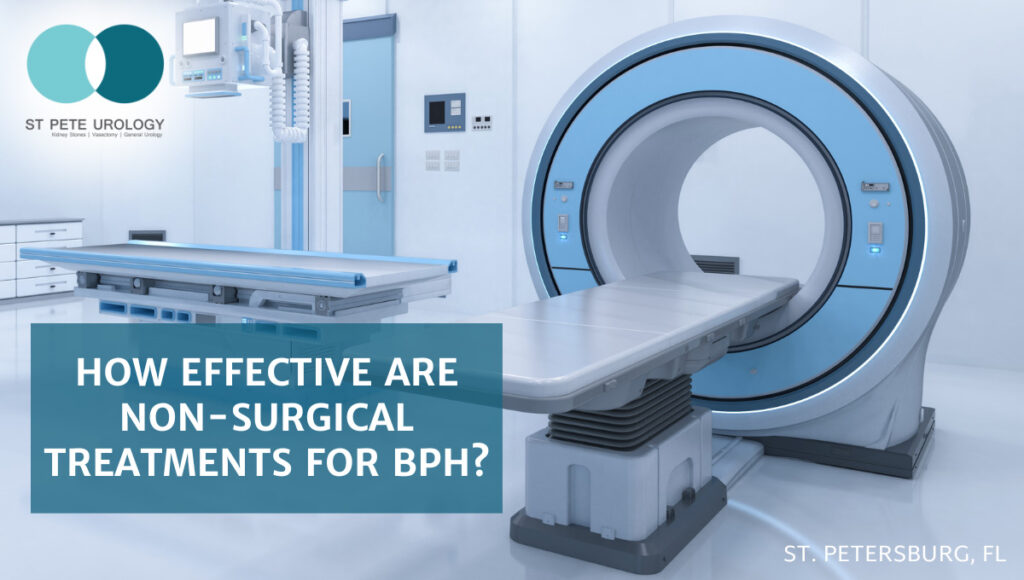Benign prostatic hyperplasia (BPH), also called enlarged prostate, is a frustrating condition commonly occurring as men grow older. Your prostate typically undergoes two phases of growth, one at puberty and another in the mid-twenties—with the second resulting in an enlarged and potentially problematic prostate.
“Although the prostate is a tiny, walnut-sized gland when you are a child, it grows and doubles in size during puberty,” says Dr. Adam Oppenheim, a board-certified urologist at St Pete Urology.
“After that, your prostate undergoes a second growth phase that begins by the age of 25 and continues for the rest of your life. It is during this second growth phase that BPH occurs,” he adds.
Symptoms of BPH
The prostate is situated below the bladder and in front of the rectum. It goes around the urethra, the tube that carries urine from the bladder, through the penis and out of the body.
As it grows, the prostate presses against the urethra and bladder, causing a narrowing of the urethra and pressure on the bladder that eventually leads to urinary retention.
“The prostate, urethra, and bladder are so closely linked that an enlargement of the prostate automatically affects the function of both the bladder and the urethra,” says Dr. Adam Oppenheim.
“An enlarged prostate presses on the urethra to narrow it and exerts extra pressure on the bladder resulting in difficulty emptying the bladder. The bladder wall thickens, the bladder muscles weaken, and the bladder loses the ability to empty fully.”
With the inability to fully empty your bladder, you will experience uncomfortable symptoms, such as the constant sensation that the bladder is not empty, frequent urination, hesitancy in urination, urgency to urinate, trouble in starting or stopping urination, and a weak urinary stream. These symptoms will adversely affect your ability to engage in various activities and likely affect your daily routine as well.
Common condition
Benign prostatic hyperplasia is a common condition. All men are at risk, and any man can get it. The older you get, the higher the risk of having it.
“If you live long enough, you are likely to develop an enlarged prostate,” says Dr. Adam Oppenheim.
“More than half of all men between the age 50 and 60 have BPH, while up to 90-percent of men above 80 have it,” he adds.
But an enlarged prostate is a benign condition. It shares many symptoms with prostate cancer and can happen simultaneously to cancer, but it is not cancer.
“BPH is not prostate cancer. Neither does it cause or lead to prostate cancer,” says Dr. Adam Oppenheim.
“However, since prostate cancer is a more serious condition that shares many symptoms with BPH, you should see your urologist as soon as possible if you have symptoms of BPH. The doctor will run a series of tests to rule out cancer.”
An array of treatment options
Benign prostatic hyperplasia is a treatable condition. Your urologist has an arsenal of safe and effective interventions that can help you overcome the problem. However, the best treatment for you depends on the severity of your symptoms, size of the prostate, your preferences, and other health conditions you might have.
“While there are several treatment options for BPH, we normally move from non-invasive to minimally invasive procedures before we opt for surgery,” says Dr. Adam Oppenheim.
“So the first step is usually watchful waiting and behavioral changes, such as Kegel exercises, bladder training, dietary changes, and controlling the type and amount of fluid intake,” he adds.
“At first, we may offer medications, such as alpha-blockers and 5-alpha reductase inhibitors, Rezum water vapor therapy, or permanent implants. But if you don’t respond well to these first-line options, we may consider surgical procedures like GreenLight laser therapy, TURP, or prostatectomy,” he explains.
What is Rezum treatment for BPH?
Rezum is a procedure that uses thermal energy stored in water vapor (steam) to destroy the extra prostate tissue that is causing urinary symptoms. The radiofrequency energy is applied to a few drops of water inside a hand-held device to create the water vapor. The high-energy vapor is then injected into the prostate tissue that blocks the flow of urine from the bladder.
“With Rezum, we inject water vapor energy into 2-7 areas, each injection taking nine seconds,” says Dr. Adam Oppenheim.
“The intention is to have the vapor disperse between cells, then cooling and releasing heat that gently disrupts the prostate cells,” he adds.
Once delivered, steam travels between cells until it encounters natural collagen barriers or the prostate capsule itself. Also, the vapor quickly condenses back to water, releasing energy into the cell membranes.
The cells absorb the energy and are gently but immediately damaged, resulting in their eventual death and the dissolution of the prostate for two weeks. Over time, the body absorbs the treated tissue through its natural healing response.
How is Rezum performed?
Rezum is a quick and straightforward procedure completed during a single 1-2 hour visit in a clinic or outpatient setting.
“Before the Rezum procedure, you shouldn’t have urine in your bladder,” says Dr. Adam Oppenheim. “Your urologist will instruct you on how to empty your bladder properly. And even with that, the bladder will be checked to ensure it is fully empty before the procedure,” he adds.
Rezum is done under local anesthesia or oral sedation. So while the prostate and penis are numbed before the Rezum device is inserted, you may still experience some discomfort. Your urologist will discuss pain management options with you to ensure you are comfortable during the procedure.
Why should you undergo Rezum treatment?
- It is a safe, effective alternative to BPH medications
- It relieves urinary symptoms quickly
- It has a high success rate, with only a 4.4 percent retreatment rate
- It is a simple in-office, outpatient therapy
- It preserves sexual and urinary functions
- It has a low rate of retrograde ejaculation
- It does not affect erections
- It does not require general anesthesia
- It provides noticeable symptom improvement within two weeks
- It allows you to return to regular activities within a few days
What should you expect after Rezum?
After the procedure, your body creates an inflammatory response that lasts two to four months. So, initially, there will be swelling in the prostate, which may restrict flow and cause more difficulty and frequency of urination. A catheter is inserted for two to five days to help with emptying your bladder.
Urinary symptoms tend to get worse after the procedure before they can get better. The symptoms will begin to stabilize only after two weeks.
Expect to be back to where you were before the procedure during the fourth week and to start getting off your medication after six weeks. But you should return to regular activities within a few days.
What are the side effects of Rezum?
Rezum reduces urinary symptoms for men diagnosed with an enlarged prostate. It is a minimally invasive procedure that has demonstrated fewer sized effects.
Like any invasive procedure, it does have some temporary side effects, including:
- Painful urination
- Frequent urination
- Inability to fully empty the bladder
- Need for short-term catheterization
- Blood in semen
- Blood in urine
Most of the side effects resolve within three weeks after the procedure, but some take a little longer. Speak with your urologist about ways to minimize the impact of these risks. For instance, you can take mild pain medication, try a warm bath, or eliminate chocolate, alcohol, and caffeine from your diet.
Safe Rezum, remarkable outcomes
St Pete Urology offers Rezum as a safe, effective and minimally invasive treatment for relieving BPH symptoms. The procedure is performed on an outpatient basis and guarantees sustained symptom improvement for at least two years.
If you are a man with BPH who wants to discontinue medications—and you are not receptive to other minimally invasive procedures, or not bothered enough by your symptoms to undergo an invasive surgical procedure—Rezum may be a good option for you.
At St Pete Urology, your urologist will work with you to develop a tailored Rezum treatment plan that will help you to manage your symptoms and live a healthy, active life.




